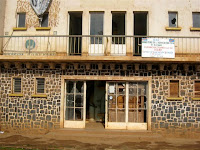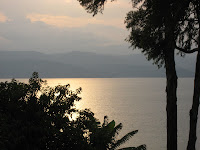 Today I’m going to talk about my trip to Bukavu in DR Congo. Where I’m staying is a 10-minute walk from the border, essentially a rickety wooden bridge marshalled by nervous looking soldiers on either side. My guidebook describes parts of Congo as very similar to Rwanda in the 90’s, so I was hoping a trip would be worth more than just the passport stamp. We were essentially going as tourists, but planned to do a degree of research for Rwanda Aid work. The size (and name) of the charity makes any expansion over the border highly unlikely but it would nevertheless be a useful exercise.
Today I’m going to talk about my trip to Bukavu in DR Congo. Where I’m staying is a 10-minute walk from the border, essentially a rickety wooden bridge marshalled by nervous looking soldiers on either side. My guidebook describes parts of Congo as very similar to Rwanda in the 90’s, so I was hoping a trip would be worth more than just the passport stamp. We were essentially going as tourists, but planned to do a degree of research for Rwanda Aid work. The size (and name) of the charity makes any expansion over the border highly unlikely but it would nevertheless be a useful exercise.
 We set off early with enough money to cover the US$35 visa and any other expenses that could arise. Leaving Rwanda was very easy but, as you might expect, the other side was trickier. Our guide led us into a run down office, full of unfriendly-looking officials. Inside one of the tiny side-rooms our passports were quickly given a particularly large and lavish stamp, before any money had changed hands. At this point we were informed that the visa was $50. A Congolese man had advised us before crossing that, if they tried this, we should turn back and return another day. Unfortunately with our passports stamped, and with a policeman blocking the door we didn’t really feel in a position to do this. To add injury to injury we were also told that without our Yellow-Fever vaccination cards we would be charged an additional $10. The visa was one thing, but I know that the card is not a requirement of entry. Indeed the money, rather unsubtly, went straight into his pocket. As frustrating as this was, I am glad that a country doesn’t really allow potential yellow-fever carriers to enter for less than the price of a DVD. Either way, I felt the experience would justify the cost.
We set off early with enough money to cover the US$35 visa and any other expenses that could arise. Leaving Rwanda was very easy but, as you might expect, the other side was trickier. Our guide led us into a run down office, full of unfriendly-looking officials. Inside one of the tiny side-rooms our passports were quickly given a particularly large and lavish stamp, before any money had changed hands. At this point we were informed that the visa was $50. A Congolese man had advised us before crossing that, if they tried this, we should turn back and return another day. Unfortunately with our passports stamped, and with a policeman blocking the door we didn’t really feel in a position to do this. To add injury to injury we were also told that without our Yellow-Fever vaccination cards we would be charged an additional $10. The visa was one thing, but I know that the card is not a requirement of entry. Indeed the money, rather unsubtly, went straight into his pocket. As frustrating as this was, I am glad that a country doesn’t really allow potential yellow-fever carriers to enter for less than the price of a DVD. Either way, I felt the experience would justify the cost.
With thin wallets but wide eyes we stepped out into what can only be described as chaos. Cars covered the unpaved streets and pavements. Bizarrely there were crippled men everywhere, either strapped into hand bikes or dragging themselves through the dust. Rwanda is by no means an organisational paradise but after 3 weeks here I was shocked by the difference.
Throughout the day we made numerous stops at various aid organisations including OCHA (the UN’s humanitarian affairs coordinator) and Christian Aid. As worthy as their individual causes undoubtedly are, you have to wonder what kind of message they send out by covering their walls in barbed wire. I suppose it is just a reminder of the continuing security problems they face.  What was incredible was the sheer number of aid organisations. Every 5th car had some group’s emblem, always with a sign that they were unarmed. The UN is the most obvious presence, with over 1000 soldiers around Bukavu alone. The nature of the organisation means that, surreally, they were all Pakistanis and Uruguayans. This heavy, if colourful, contingent pales in comparison with the 15,000 men that the Congolese army has stationed there.
What was incredible was the sheer number of aid organisations. Every 5th car had some group’s emblem, always with a sign that they were unarmed. The UN is the most obvious presence, with over 1000 soldiers around Bukavu alone. The nature of the organisation means that, surreally, they were all Pakistanis and Uruguayans. This heavy, if colourful, contingent pales in comparison with the 15,000 men that the Congolese army has stationed there.

The main message coming from the aid workers was that DRC is stuck in an endless cycle. The war caused destruction of infrastructure, which creates an uneducated and unemployed populace, in turn encouraging ignorance and anger, the main causes of the civil war. 
As well as aid groups, the city is fat with government buildings. I saw more ministries than schools, hospitals and banks combined. While this paints an unrealistic picture of the government presence here, it certainly demonstrates the ineffective way they apply themselves. Many seem abandoned, and have fallen into disrepair. The Congolese, unfortunately, seem to have fallen for the old trap of quantity over quality.
Probably the most interesting thing was my visit to the region’s parliament. We met its vice-president, a rather imposing man who didn’t seem as impressed as I am by my cowboy hat. He gave us a long list of problems that, amazingly, my GCSE French managed to understand. It got rather embarrassing when I tried to reply, but never mind. What was interesting was his assertion that, without political change, the massive NGO presence would be futile. This may sound incredibly pessimistic, but it is hard to disagree. Government employees haven’t been paid for years, which leaves soldiers looting and teachers charging parents for schooling. Instability, illiteracy and corruption follow suit, stopping development. I almost began to sympathise with the dishonest border official, maybe with a family to feed.
In organisation, security and wealth Congo lags quite significantly behind its neighbour. The last was the biggest surprise. Before going over many Rwandans had enviously told me of Congo’s wealth but I was at best sceptical. The reality was a gaping divide between the haves and the haven’ts. No doubt Rwanda has a similar problem, but not on the same scale. Vast houses cover the lakeside (possibly contributing to the Rwandans take on things) and, although many are empty, there is certainly no shortage of expensive 4x4s and barbed fencing. I never thought I’d say this, but as I crossed into Rwanda I felt glad to be back in civilisation.
I have been offered the chance to travel with the UN into the lawless interior. Whether I’ll accept is uncertain. It was a fascinating but uncomfortable experience.
TY
 Today I’m going to talk about my trip to Bukavu in DR Congo. Where I’m staying is a 10-minute walk from the border, essentially a rickety wooden bridge marshalled by nervous looking soldiers on either side. My guidebook describes parts of
Today I’m going to talk about my trip to Bukavu in DR Congo. Where I’m staying is a 10-minute walk from the border, essentially a rickety wooden bridge marshalled by nervous looking soldiers on either side. My guidebook describes parts of 

















